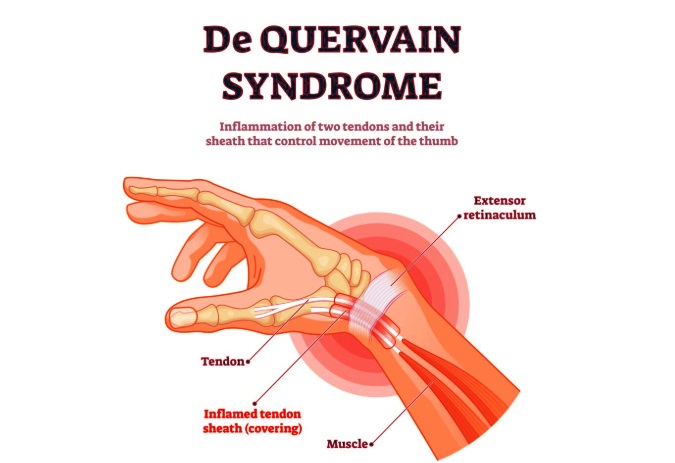Nikhil Prasad Fact checked by:Thailand Medical News Team Jan 22, 2025 2 months, 3 weeks, 6 days, 8 hours, 14 minutes ago
Medical News: De Quervain’s tenosynovitis is a frequently encountered wrist condition characterized by pain on the thumb side of the wrist. It is often attributed to repetitive movements or strain. However, a fascinating case presented by researchers from the Department of Orthopaedic Surgery at Virginia Commonwealth University, the University of California San Francisco-Fresno, and the University of Virginia sheds light on a potential connection between viral infections and the recurrence of this disorder.
 SARS-CoV-2 and Influenza Infections and Recurrent Wrist Pain
SARS-CoV-2 and Influenza Infections and Recurrent Wrist Pain
The study centers on a 39-year-old male physician who developed De Quervain’s tenosynovitis, only to experience recurring symptoms following infections with SARS-CoV-2 and Influenza A. The detailed case not only brings attention to a potential inflammatory link between viral illnesses and tendon disorders but also raises important questions about the mechanisms underlying such conditions. This
Medical News report delves into the study’s findings, key observations, and broader implications for understanding De Quervain’s tenosynovitis.
Understanding De Quervain’s Tenosynovitis
De Quervain’s tenosynovitis is commonly linked to repetitive stress or strain. Patients often report tenderness and swelling over the wrist's radial side, with pain exacerbated by specific thumb and wrist movements. Classic diagnostic methods include the Finkelstein and Eichhoff tests, which reproduce the characteristic pain when performed. Initial treatment often involves corticosteroid injections and splinting, with most cases resolving without surgery.
Traditionally, De Quervain’s tenosynovitis has been viewed as a mechanical issue resulting from tendon overuse. However, growing evidence suggests that inflammatory processes might play a significant role in some cases. Recent studies have highlighted the presence of inflammatory biomarkers, such as interleukin-1β and tumor necrosis factor-alpha, in patients with tendon disorders. This emerging understanding challenges older views and broadens the scope for exploring conditions like De Quervain’s tenosynovitis.
The Case in Detail
The subject of this study was a healthy 39-year-old man with no prior medical history. He first sought treatment for De Quervain’s tenosynovitis after experiencing wrist pain, which he attributed to poor positioning during air travel and lifting his young children. Initial management with a corticosteroid injection led to full symptom resolution within a week.
Months later, the patient developed a fever and tested positive for SARS-CoV-2. Notably, within 24 hours of fever onset, his wrist symptoms returned, this time without any mechanical triggers like lifting. A second corticosteroid injection once again resolved his symptoms, suggesting a potential inflammatory component triggered by the viral infection.
In December of the same year, the patient contracted Influenza A despite receiving a flu vaccine. During thi
s illness, he experienced another recurrence of wrist pain, which did not resolve with conservative measures. Surgery was eventually performed, revealing a thickened tendon sheath and confirming the presence of an abnormal sub-sheath, which is linked to higher recurrence rates. Post-surgical recovery was complete, and the patient has since remained symptom-free.
Insights from the Study
This case is particularly compelling due to the clear temporal association between viral illnesses and symptom recurrence. The researchers hypothesized that systemic inflammation triggered by viral infections might lead to localized tendon inflammation in susceptible individuals. SARS-CoV-2 and Influenza A are known to induce strong immune responses, including the release of cytokines and other inflammatory mediators. These responses could potentially exacerbate underlying or dormant inflammatory processes within the tendon sheath.
Interestingly, this is not the first study to suggest a link between viral infections and tendon disorders. A 2021 retrospective study associated De Quervain’s tenosynovitis with an increased risk of Herpes Zoster infection. However, the present study is among the first to document a direct connection between SARS-CoV-2, Influenza A, and De Quervain’s symptoms. The findings underscore the need for further research into the interplay between systemic infections and musculoskeletal conditions.
The Role of Inflammation
While De Quervain’s tenosynovitis has historically been categorized as a non-inflammatory condition, recent evidence challenges this notion. Studies have demonstrated the presence of inflammatory cells and cytokines in tendon tissues, suggesting that inflammation might contribute to the early stages of tendon damage. In this case, the recurrent symptoms following viral illnesses further support the idea that inflammation plays a central role in the condition’s pathophysiology.
The findings also highlight the potential role of genetic predisposition. Certain genetic markers have been associated with an increased risk of developing De Quervain’s tenosynovitis, suggesting that some individuals may be more susceptible to inflammation-driven tendon damage.
Conclusions and Implications
This case report raises several important questions about the relationship between viral infections and tendon disorders. While the exact mechanisms remain unclear, the study suggests that systemic inflammation from viral illnesses could trigger localized tendon inflammation in predisposed individuals. These findings have significant implications for both diagnosis and treatment.
For clinicians, recognizing the potential link between systemic infections and musculoskeletal symptoms could improve patient care. Early intervention, such as corticosteroid injections, may help mitigate symptoms and prevent disease progression. For researchers, this case highlights the need for further studies exploring the inflammatory mechanisms underlying De Quervain’s tenosynovitis and other tendon disorders.
Additionally, the study underscores the importance of a multidisciplinary approach. Collaboration between orthopedists, infectious disease specialists, and immunologists could lead to more comprehensive insights into the condition and its triggers.
Ultimately, this report serves as a reminder of the complex interplay between systemic health and localized conditions. As our understanding of these relationships evolves, so too will our ability to provide effective and personalized care to patients.
The study findings were published in the peer-reviewed journal: Case Reports in Infectious Diseases.
https://onlinelibrary.wiley.com/doi/10.1155/crdi/5117572
For the latest on Viral Infections, keep on logging to Thailand
Medical News.
Read Also:
https://www.thailandmedical.news/news/covid-19-news-greek-study-finds-the-prevalence-of-gastrointestinal-bleeding-in-many-covid-19-patients
https://www.thailandmedical.news/news/covid-19-news-sars-cov-2-impairs-oxygen-delivery-by-altering-red-blood-cell-hematological,-hemorheological-and-oxygen-transport-properties
https://www.thailandmedical.news/news/covid-19-news-italian-study-finds-that-sars-cov-2-infections-causes-alterations-of-circulating-peptidome-in-human-host
https://www.thailandmedical.news/articles/coronavirus
